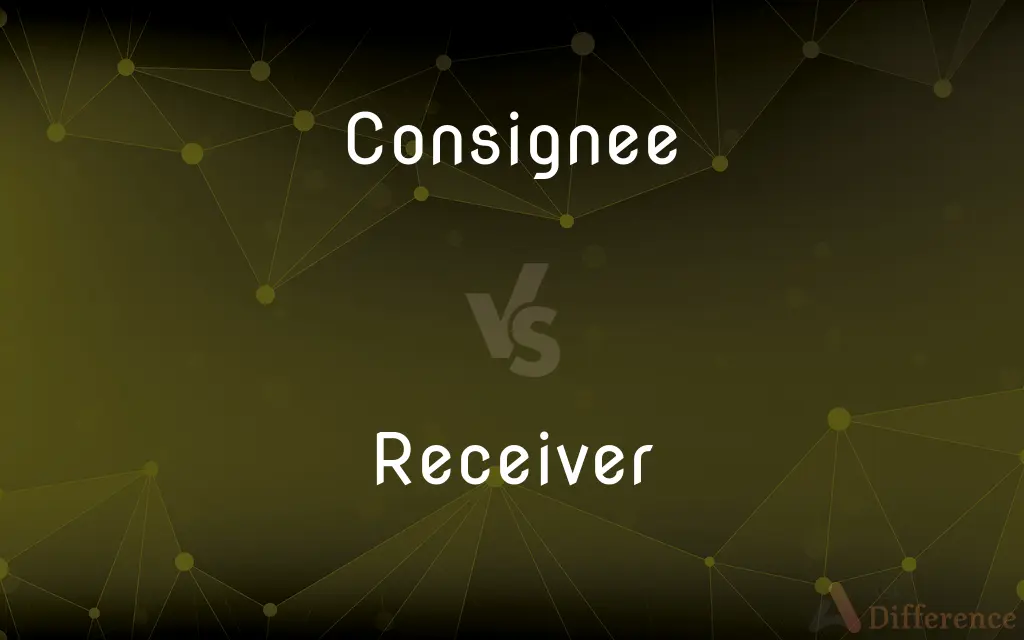Consignee vs. Receiver — What's the Difference?
By Tayyaba Rehman — Updated on September 17, 2023
"Consignee" refers to the party to whom goods are shipped and are to be sold or delivered, while "Receiver" is a general term for any individual or entity receiving something.

Difference Between Consignee and Receiver
Table of Contents
ADVERTISEMENT
Key Differences
In the realm of shipping and trade, a "Consignee" is specifically the individual or entity listed to receive the shipped goods, particularly for selling or delivery purposes. In contrast, the term "Receiver" denotes any individual or entity who receives any item or information, making it a more general term.
Suppose you're sending a shipment of books to a bookstore. The bookstore is the "Consignee" because it's the designated recipient of the shipment for the purpose of selling those books. If you send a gift to a friend, while your friend is the one receiving the gift, they're more aptly described as the "Receiver" and not the consignee.
It's worth noting that while all "Consignees" are receivers (since they're receiving goods), not all "Receivers" are consignees. A consignee's role often comes with specific obligations or contractual agreements tied to the received goods. A "Receiver" might just be someone getting a letter or parcel without any such obligations.
In legal settings, the term "Receiver" can also have a distinct meaning, like someone appointed to manage the assets of a company. "Consignee", on the other hand, remains consistent in its association with shipping and trade.
Comparison Chart
Definition
Entity to whom goods are shipped for selling/delivery.
Any individual/entity receiving something.
ADVERTISEMENT
Scope
Specific to shipping/trade.
Broad and general.
Obligations
Often has obligations or contracts tied to goods.
May or may not have obligations.
Usage
Used mainly in commercial transactions.
Used universally in various contexts.
Examples
Bookstores, wholesalers, retailers.
Gift recipients, mail recipients, legal receivers.
Compare with Definitions
Consignee
An individual or entity in a consignment agreement.
The artist is the consignee at the gallery, receiving profits from sold paintings.
Receiver
A device that converts signals into sound or visuals.
The radio receiver picked up a signal from a distant station.
Consignee
An entity designated to receive shipped goods for sale or delivery.
The consignee for the electronics shipment is the downtown retailer.
Receiver
The party obtaining goods, services, or information.
The email's intended receiver did not find it in their inbox.
Consignee
The party listed on a bill of lading or airway bill.
Ensure the consignee's address on the invoice matches the one on the package.
Receiver
The part of a telephone apparatus contained in the earpiece, in which electrical signals are converted into sounds.
Consignee
The party responsible for the goods upon delivery.
As the consignee, the store must check the delivered goods for damage.
Receiver
A person who gets or accepts something that has been sent or given to them
The receiver of a gift
Consignee
In a contract of carriage, the consignee is the entity who is financially responsible (the buyer) for the receipt of a shipment. Generally, but not always, the consignee is the same as the receiver.
Receiver
A person or company appointed by a court to manage the financial affairs of a business or person that has gone bankrupt
The company is in the hands of the receivers
Consignee
The one to whom something, such as goods or merchandise, is consigned.
Receiver
A container for collecting the products of distillation, chromatography, or other process.
Consignee
The person to whom a shipment is to be delivered.
Receiver
The part of a firearm which houses the action and to which the barrel and other parts are attached.
Consignee
One to whom anything is consigned or entrusted.
Receiver
One that receives something:a receiver of many compliments.
Consignee
The person to whom goods or other things are consigned; a factor; - correlative to consignor.
Consigner and consignee are used by merchants to express generally the shipper of merchandise, and the person to whom it is addressed, by bill of lading or otherwise.
Receiver
A device, such as a part of a radio, television set, or telephone, that converts incoming electromagnetic signals into sound, light, or electrical signals.
Consignee
The person to whom merchandise is delivered over
Receiver
A person appointed by a court to receive and responsibly administer funds or property connected with ongoing litigation.
Consignee
The designated end recipient in a shipping transaction.
The consignee must be notified of any shipping delays.
Receiver
A person who knowingly buys or receives stolen goods.
Receiver
A receptacle intended for a specific purpose.
Receiver
(Football)A member of the offensive team eligible to catch a forward pass.
Receiver
(Sports)A player who receives a pass.
Receiver
(Baseball)The catcher.
Receiver
A person.
Receiver
An official whose job is to receive taxes or other monies; a tax collector, a treasurer.
Receiver
A person who receives something in a general sense; a recipient.
Receiver
A person who accepts stolen goods.
Receiver
A person or company appointed to settle the affairs of an insolvent entity.
Receiver
(American football) An offensive player who catches the ball after it has been passed.
Receiver
(racquet sports) A person who attempts to return the serve.
Receiver
An item or apparatus.
Receiver
Something which receives some substance or object, in a general sense; a receptacle.
Receiver
(chemistry) A vessel for receiving and holding the products of distillation, or for containing gases.
Receiver
An airtight vessel from which air is pumped in order to form a vacuum.
Receiver
(firearms) The part of a firearm containing the action.
Receiver
A vessel for receiving the exhaust steam from the high-pressure cylinder before it enters the low-pressure cylinder, in a compound steam engine.
Receiver
Any of several electronic devices that receive electromagnetic waves, or signals transmitted as such.
Receiver
The part of a telephone handset contained in the earpiece; hence the handset itself; an earpiece.
Receiver
(finance) A swaption which gives its holder the option to enter into a swap in which they pay the floating leg and receive the fixed leg.
Receiver
One who takes or receives in any manner.
Receiver
A person appointed, ordinarily by a court, to receive, and hold in trust, money or other property which is the subject of litigation, pending the suit; a person appointed to take charge of the estate and effects of a corporation, and to do other acts necessary to winding up its affairs, in certain cases.
Receiver
One who takes or buys stolen goods from a thief, knowing them to be stolen.
Receiver
A vessel connected with an alembic, a retort, or the like, for receiving and condensing the product of distillation.
Receiver
The glass vessel in which the vacuum is produced, and the objects of experiment are put, in experiments with an air pump. Cf. Bell jar, and see Illust. of Air pump.
Receiver
A vessel for receiving the exhaust steam from the high-pressure cylinder before it enters the low-pressure cylinder, in a compound engine.
Receiver
That portion of a telephonic apparatus, or similar system, at which the message is received and made audible; - opposed to transmitter.
Receiver
In portable breech-loading firearms, the steel frame screwed to the breech end of the barrel, which receives the bolt or block, gives means of securing for firing, facilitates loading, and holds the ejector, cut-off, etc.
Receiver
Set that receives radio or tv signals
Receiver
(law) a person (usually appointed by a court of law) who liquidates assets or preserves them for the benefit of affected parties
Receiver
Earphone that converts electrical signals into sounds
Receiver
A person who gets something
Receiver
A football player who catches (or is supposed to catch) a forward pass
Receiver
An individual or entity who gets or accepts something.
The receiver of the package was not at home during delivery.
Receiver
A person appointed to manage a company's assets, especially in bankruptcy.
The court appointed a receiver to oversee the company's liquidation.
Receiver
One who accepts or collects something that has been sent.
The payment receiver processed all the transactions for the day.
Common Curiosities
Can a "Receiver" be involved in legal settings?
Yes, especially when appointed to manage assets.
Is a "Consignee" always involved in trade or business transactions?
Typically, yes, as they're designated for selling or delivering goods.
Who handles customs clearances in shipments?
Often the consignee, or their agent.
Can a "Receiver" be someone getting a simple letter?
Yes, it's a broad term.
Do "Consignees" need to be informed of shipping delays?
Typically, yes, for planning and contractual reasons.
Is every "Consignee" also a "Receiver"?
Yes, because they're receiving goods.
Does a "Receiver" always have obligations tied to received items?
No, it depends on the context.
If I send a gift to a friend, are they the "Consignee"?
They're more aptly termed the "Receiver".
What's a common document to find a "Consignee" listed?
A bill of lading or airway bill.
Is every mail recipient a "Receiver"?
Yes, as they're receiving mail.
Can a "Receiver" be an electronic device?
Yes, like a radio or TV receiver.
Is the "Consignee" responsible for checking delivered goods?
Typically, yes, especially in trade settings.
Are the terms "Consignee" and "Receiver" interchangeable?
Not always; while all consignees are receivers, not all receivers are consignees.
Is "Consignee" specific to maritime shipping?
No, it applies to various shipping methods.
Can a "Receiver" be a position in football?
Yes, it's a player who catches passes.
Share Your Discovery

Previous Comparison
Wharf vs. Pier
Next Comparison
Poke vs. ProdAuthor Spotlight
Written by
Tayyaba RehmanTayyaba Rehman is a distinguished writer, currently serving as a primary contributor to askdifference.com. As a researcher in semantics and etymology, Tayyaba's passion for the complexity of languages and their distinctions has found a perfect home on the platform. Tayyaba delves into the intricacies of language, distinguishing between commonly confused words and phrases, thereby providing clarity for readers worldwide.














































